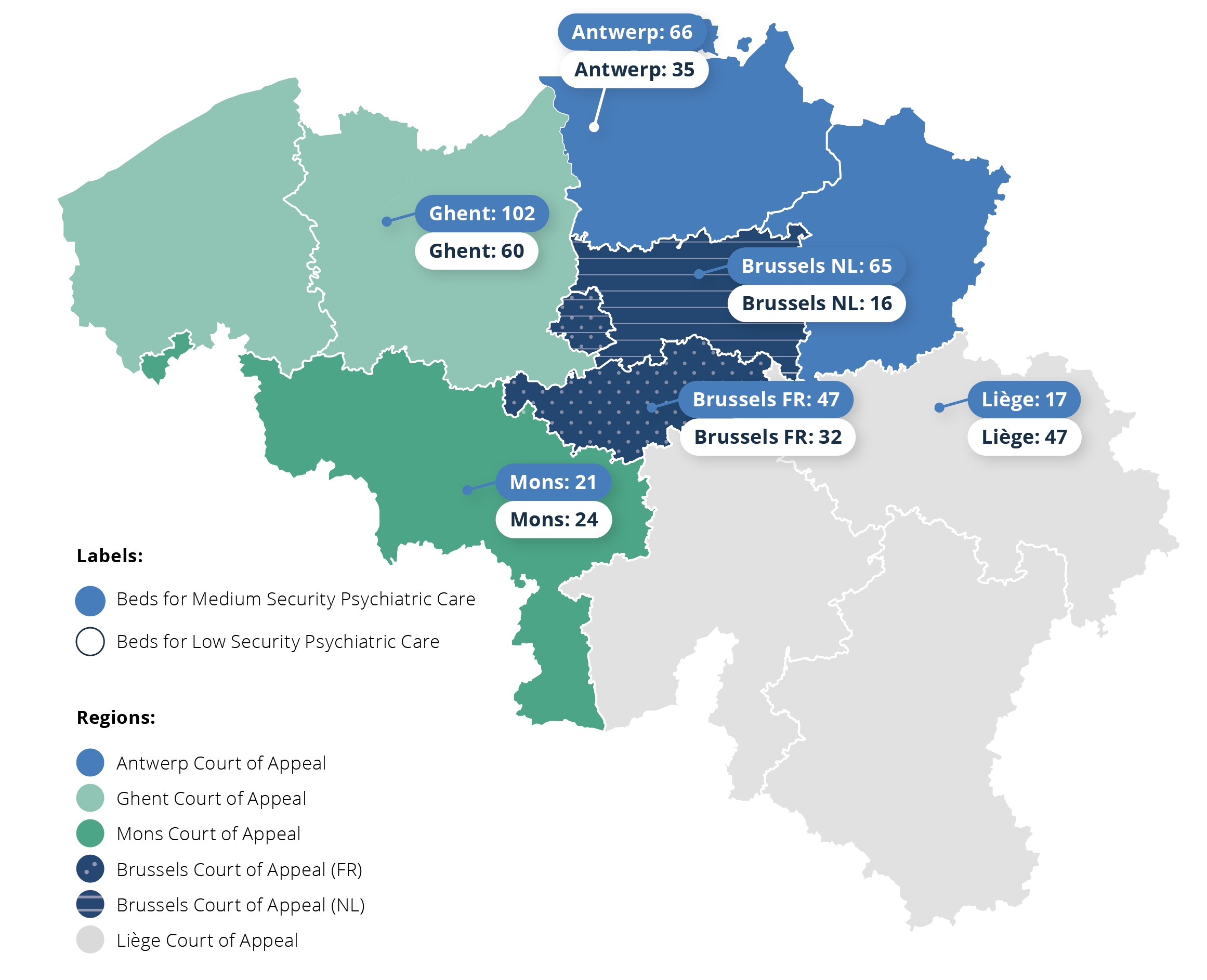Care pathway for internees
 |
Internment is a legal security measure ordered by the criminal court for persons with mental illness who have committed a crime but who are deemed by the criminal court judges to have not been in control of their actions, and who also pose a danger to society. This internment measure under criminal law should not be confused with involuntary admission under civil law, whereby no crime has been committed.
|
It was standard practice for many years for internees to stay indefinitely in the psychiatric wards or society protection departments of correctional institutions. As the care provided in these institutions was inadequate, Belgium was regularly the subject of criticism by the European Committee for the Prevention of Torture and Inhuman or Degrading Treatment or Punishment. Ultimately, the Belgian State had numerous rulings pronounced on it by the European Court of Human Rights.
Under this pressure from within Europe, the governments invested in forensic care and the ‘Masterplans’, as they were known, came into being. The ‘Masterplan for Internment’ focuses on forensic psychiatric care. This stipulates that every internee is entitled to appropriate care.
As part of mental health reform in 2014, a care pathway was developed for internees thanks to the launch of networks organised by the Court of Appeals (CoA). Network collaboration means that care providers and actors work together to realise personalised care pathways, based on the healthcare needs of patients.
The residential care offering for internees can be broadly divided by security level:
- High security care facilities provide care for internees with high risk profiles and high security needs;
- Medium security facilities/departments provide care for internees with moderate risk profiles and increased security needs;
- Low security facilities provide care for internees with low risk profiles and low security needs.


Number of crisis and time-out beds
Number of FTE for mobile and outpatient care for internees
Number of places for internees in PCH, SHI and alternative housing
Evolution in number of internees inside and outside prison
|
An average of 83% of internees stayed in a facility outside prison from 2018 to 2022. This equated to 3,263 people in 2022. Around one fifth of internees were placed in a Belgian prison. This equated to 486 people in 2018. This number rose to 850 by 2022[1]. This increase is mainly due to an increase in orders for internment. |
More information: https://www.internement.be/
Profile of the internees in a FPS health-funded care facility (excluding FPC)[2]
In 2020, there were 2,174 internees receiving treatment/support in a FPS Public Health-funded care service for this target group (excluding care capacity in forensic psychiatric centres (FPC)). These patients are cared for outside prison. The average age was 43.
Percentage of internees by age group
Top 3 most common offences among internees
|
More than one third of internees committed a violent crime against people, including beatings and wounding and unruly behaviour. Almost 20% committed a sexual offence and 13% were committed for a non-violent property offence. |
Top 5 most common diagnoses among internees
|
More than two thirds (78.6%) of internees had substance abuse problems. Other common diagnoses were psychoses (61.5%) and personality disorders (54.9%). In addition, over one third of involuntarily committed patients (36.2%) were also diagnosed with a mental disability. About 80% of the cases involved two or more comorbid disorders. |
[1]Source: Chamber of Society Protection
[2]Delannoy, D., Jeandarme, I., Pham, T., Pouls, C. (2023). Onderzoeksrapport Zorgtraject geïnterneerden [Research Report on Care Pathway for Involuntarily Committed Patients – 2020. Gent. Accessed 1 October 2023, from https://www.researchgate.net/publication/362889778_ Onderzoeksrapport_Zorgtraject_geinterneerden_-_2018; this refers to in FPS Public Health-funded care capacity (excluding Forensic Psychiatric Centres (FPC))
